
Richard McGarrah Helms was an American government official and diplomat who served as Director of Central Intelligence (DCI) from 1966 to 1973. Helms began intelligence work with the Office of Strategic Services during World War II. Following the 1947 creation of the Central Intelligence Agency (CIA), he rose in its ranks during the presidencies of Truman, Eisenhower and Kennedy. Helms then was DCI under Presidents Johnson and Nixon, yielding to James R. Schlesinger in early 1973.

William Joseph "Wild Bill" Donovan was an American soldier, lawyer, intelligence officer and diplomat. He is best known for serving as the head of the Office of Strategic Services (OSS), the precursor to the Bureau of Intelligence and Research and the Central Intelligence Agency (CIA), during World War II. He is regarded as the founding father of the CIA, and a statue of him stands in the lobby of the CIA headquarters building in Langley, Virginia.

The director of central intelligence (DCI) was the head of the American Central Intelligence Agency from 1946 to 2004, acting as the principal intelligence advisor to the president of the United States and the United States National Security Council, as well as the coordinator of intelligence activities among and between the various US intelligence agencies.
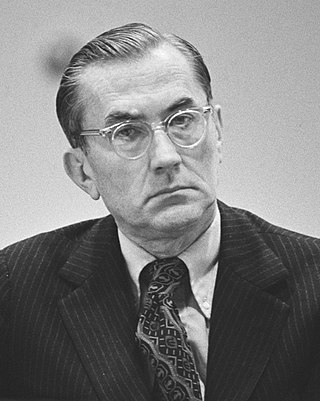
William Egan Colby was an American intelligence officer who served as Director of Central Intelligence (DCI) from September 1973 to January 1976.
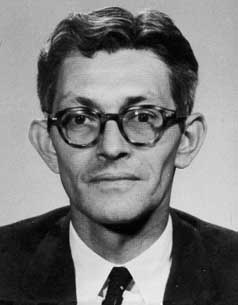
James Jesus Angleton was an American intelligence operative who served as chief of the counterintelligence department of the Central Intelligence Agency from 1954 to 1975. According to Director of Central Intelligence Richard Helms, Angleton was "recognized as the dominant counterintelligence figure in the non-communist world".
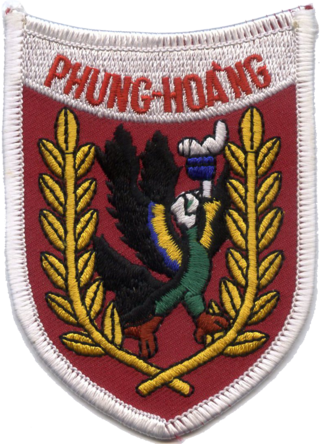
The Phoenix Program was designed and initially coordinated by the United States Central Intelligence Agency (CIA) during the Vietnam War, involving the American, South Vietnamese militaries, and a small amount of Special forces operatives from the Australian Army Training Team Vietnam. In 1970, CIA responsibility was phased out, and the program was put under the authority of the Civil Operations and Revolutionary Development Support (CORDS).
Oleg Danilovich Kalugin is a former KGB general. He was during a time, head of KGB political operations in the United States and later a critic of the agency. After being convicted of spying for the West in absentia during a trial in Moscow, he remained in the US and was sworn in as a citizen on 4 August 2003.
Theodore George "Ted" Shackley, Jr. was an American CIA officer involved in many important and controversial CIA operations during the 1960s and 1970s. He is one of the most decorated CIA officers. Due to his "light hair and mysterious ways", Shackley was known to his colleagues as "the Blond Ghost".
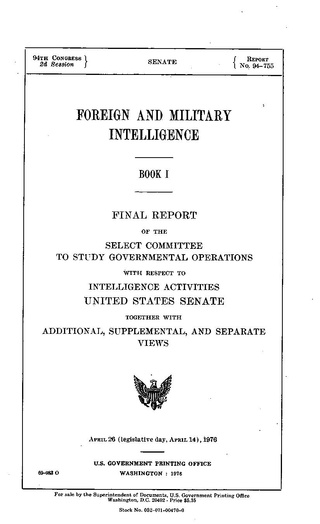
The Church Committee was a US Senate select committee in 1975 that investigated abuses by the Central Intelligence Agency (CIA), National Security Agency (NSA), Federal Bureau of Investigation (FBI), and the Internal Revenue Service (IRS). Chaired by Idaho Senator Frank Church (D-ID), the committee was part of a series of investigations into intelligence abuses in 1975, dubbed the "Year of Intelligence", including its House counterpart, the Pike Committee, and the presidential Rockefeller Commission. The committee's efforts led to the establishment of the permanent US Senate Select Committee on Intelligence.
Clair Elroy George was a veteran of the Central Intelligence Agency's (CIA) clandestine service who oversaw all global espionage activities for the agency in the mid-1980s. According to The New York Times, George was "a consummate spymaster who moved the chess pieces in the CIA's clandestine games of intrigue".
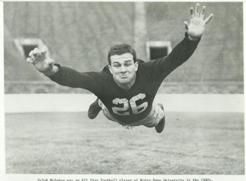
Ralph Walter McGehee Jr was an American case officer for the Central Intelligence Agency (CIA) for 25 years and an author.

John Owen Brennan is a former American intelligence officer who served as the Director of the Central Intelligence Agency (CIA) from March 2013 to January 2017. He served as chief counterterrorism advisor to U.S. President Barack Obama, with the title Deputy National Security Advisor for Homeland Security and Counterterrorism, and Assistant to the President. Previously, he advised Obama on foreign policy and intelligence issues during the 2008 election campaign and presidential transition.

First Run Features is an independent film distribution company based in New York City.
At various times, under its own initiative or in accordance with directives from the President of the United States or the National Security Council staff, the Central Intelligence Agency (CIA) has attempted to influence public opinion both in the United States and abroad.

Michael Comly Bacon is an American singer-songwriter, musician and film score composer. He is the older brother of actor Kevin Bacon. He is a faculty member in music at Lehman College.
Sally Angela Shelton-Colby is an American diplomat. She was Ambassador of the United States to Barbados, Grenada and Dominica as well as Minister to St Lucia, and Special Representative to Antigua, St. Christopher-Nevis-Anguilla, and St. Vincent from 1979 to 1981, under Jimmy Carter.

Peer de Silva was a station chief in the Central Intelligence Agency (CIA). A 1941 West Point graduate, during World War II he served as an Army officer providing security for the Manhattan Engineer District; this undercover project sought to build the first atomic bomb. After the war, he joined a pre-CIA military intelligence unit. Then, having learned Russian, he worked in central Europe, frequently traveling to Moscow. Resigning from the Army, he rose within CIA ranks, becoming a chief of station (COS). He first held such rank in Vienna, 1956–1959.
The Spymasters: CIA In the Crosshairs is a 2015 documentary film which covers the experience of the Central Intelligence Agency as seen through the eyes of the twelve living CIA directors, all of whom were interviewed for the film. Directed and produced by Jules Naudet, Gedeon Naudet, and Chris Whipple, the documentary was aired on Showtime in the United States November 28, 2015. The project involved interviews which took more than a year and a half to conduct, beginning with former Director of Central Intelligence and 41st president George H. W. Bush and ending with George Tenet. The film also contains interviews with numerous other government figures and addresses the September 11 attacks, torture, Iraq War, and weapons of mass destruction controversies, as well as drone strikes. The disagreements among the former directors underscore the issues confronting the Agency, political leaders, and the American people. The former directors and the current director, however, seem to agree when it comes to War on Terror: "You cannot kill your way out of this."
RYPE was the codename of the American airborne unit who in WW2 was dropped in the Norwegian mountains of Snåsa on March 24, 1945 to carry out sabotage actions behind enemy lines. From the base at the Gjefsjøen mountain farm, the group conducted successful railroad sabotages, with the intention of preventing the withdrawal of German forces from northern Norway. Rype was the only U.S. operation on Norwegian soil during WW2. The unit was part of Office of Strategic Services (OSS), a US intelligence agency during World War II and the forerunner of the Central Intelligence Agency - CIA. They consisted mainly of Norwegian Americans recruited from the 99th Infantry Battalion US Army and was led by later CIA boss William Colby. Today Task Force RYPE of the Norwegian Home Guard in Trøndelag has taken the name of the action. The building used as headquarter for Operasjon Rype has in the period 2018-2021 been under restoration.












